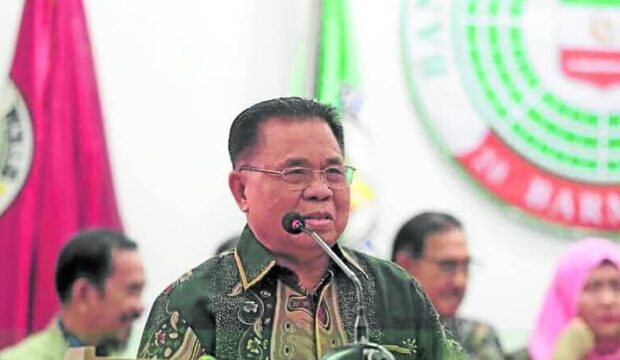
Ahod “Al Haj Murad” Ebrahim —PHOTO COURTESY OF BANGSAMORO INFORMATION OFFICE
COTABATO CITY—The parliament of the Bangsamoro Autonomous Region in Muslim Mindanao (BARMM) has passed the landmark Local Governance Code that defines the relationship and the sharing of powers and resources between the regional government and its constituent local governments.
Chief Minister Ahod “Al Haj Murad” Ebrahim went to the parliament session hall on Thursday night to sign the measure into law after its passage during the plenary, as shepherded by the committee on local government chaired by Member of Parliament Raissa Jajurie.
The measure was approved with 57 affirmative votes against four negative. There was no abstention.
Jajurie said Bangsamoro Autonomy Act No. 49 mainly features the empowerment of local government units (LGUs) and local communities, facilitation of gradual devolution of power from the BARMM, equitable revenue sharing, promotion of democratization, and supervision between the Bangsamoro government and LGUs.
“At the heart of the code is the grant of powers to LGUs,” Jajurie said.
Ebrahim said the code “will not only redefine but also solidify the autonomous region’s governance landscape by forging a well-defined and harmonious path between the regional government and the LGUs.”
“The code is more than just a set of rules; it is a manifestation of our commitment to the Bangsamoro people and their march towards a brighter future,” said parliament Speaker Pangalian Balindong.
The code mandates the gradual devolution of authority to ensure a deliberate transfer of power as well as technical and financial capability to the local governments.
With the code’s passage, 40 percent of the Bangsamoro government’s share in national taxes, fees and charges collected within the region will be allocated to LGUs.
The code also sought to address the dominance of a few well-entrenched families in holding political power in the region.
Under the new law, no two members of a family, up to the second civil degree of consanguinity or affinity, are allowed to vie for elective office in the same locality. Similarly barred are relatives, up to the second civil degree of consanguinity or affinity, of incumbent officials.


